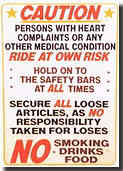Friday, August 14, 2009
Thought loops
My shrink had time to chat a little with me yesterday. He was running late as usual but not busy, & I didn't mind the wait; the walk over there was like a tepid steam bath, drizzly & humid.
The first thing he asks after How are you, Robert? is Any thoughts of suicide? My answer is usually that I'm dealing with them, which is good enough if I'm not really stressed by any external situation. Because I've had those thoughts all the way back into early adolescence. He was glad I was making an effort to take Wellbutran every day. The problem with meds is if they lift me enough, they can increase anxiety, which in turn can send me up or down. Zoloft did that. I've been on awful emotional roller coasters, rode them for decades. The roller coaster, not the thoughts, is what eventually got to me. The highs became higher & more brief, the lows lower & longer. I don't want to go on a regimen of counteracting mood medications, which is what the prescription drug TV ads sell; meds on top of meds. Psychiatrists, unlike most psychologists, are all too willing to recommend one more med to treat one more mood symptom the med you're already taking either doesn't treat or actually causes.
I described to the doctor - I've been his patient for a long time - how suicidal ideation often occurs as a thought loop, out of nowhere, with no apparent trigger except, perhaps, a memory, & when I recognize how I'm thinking I'm able to stop the loop by forcing myself to concentrate on something else. This simple advice was given to me by both a friend who occasionally ideaized & my former therapist. Oddly, the Doc had never heard ideation described as a loop mechanism. He does deal with that sort of thing in patients who hear voices. I hear only my own voice.
But the ability to thought loop is common in creativity. Repetitiveness to the point of obsessional thinking or action is necessary for practice & for development of an idea. Musicians do it all the time. Composers fixate on a single musical phrase until something in it breaks open into what follows. I've stopped in the middle of writing, prose or poem, like I've run into a barrier, gone out walking somewhere, repeating a sentence or line over & over in my mind, almost unaware I'm doing it, & suddenly the barrier drops & words flow as if being dictated. At that point the challenge is to let it flow while also remembering it. If you're a writer, you're familiar with these moments, fishing in your pockets or handbag or backpack for a ballpoint & scrap of paper, anything you can write on. I've jotted key words & phrases on napkins, restaurant checks, matchbook covers, on my arm. I've borrowed pens from waitresses. I recall borrowing a pen from a bar waitress when she brought the check, to complete a thought about the waitress I began when we ordered our first round. All through that evening I'd been distracted during conversation, by her & by what I knew might be the first line of a good poem. Others at the table probably noticed my attention drifting from time to time, I could not put the line out of my mind. One also has to let go of a good line when it goes nowhere.
I used to visit a painter friend, before he moved out of the area, who would have every light in his place turned on, plus the TV in one room & a radio or record player in another, & he'd have a painting-in-progress propped on a table with some paints & brushes next to it, & we'd be hanging out & chatting, but he'd keep glancing at the painting, & as we talked he'd get up, walk over to the painting, & begin working on it. So while we had been talking he had also been fixated on whatever had made him put the brushes down. A lot of painters have the ability to carry on a conversation about anything with one part of the mind while solving a creative problem with another part. There may be more friendships between poets & painters than poets & poets, but that's another blog post topic.
Repetitive thinking can also be channeled into bad memories, anger, & ideation. Many artists are disturbed. For many mental health professionals, creativity is symptomatic expression. But they have differing ideas on how to manage it. My therapist viewed creativity positively as having its own psychological dynamics - she wasn't concerned with analyzng the art itself - apart from the difficulties of an artist lifestyle in America, the encouragement one did or did not receive from friends & family, & the underlying causes of self-destructive behavior, which did concern her very much. She admired artistic people. She was Russian.
"If a nation expects to be ignorant and free, in a state of civilization, it expects what never was and never will be." Thomas Jefferson
The first thing he asks after How are you, Robert? is Any thoughts of suicide? My answer is usually that I'm dealing with them, which is good enough if I'm not really stressed by any external situation. Because I've had those thoughts all the way back into early adolescence. He was glad I was making an effort to take Wellbutran every day. The problem with meds is if they lift me enough, they can increase anxiety, which in turn can send me up or down. Zoloft did that. I've been on awful emotional roller coasters, rode them for decades. The roller coaster, not the thoughts, is what eventually got to me. The highs became higher & more brief, the lows lower & longer. I don't want to go on a regimen of counteracting mood medications, which is what the prescription drug TV ads sell; meds on top of meds. Psychiatrists, unlike most psychologists, are all too willing to recommend one more med to treat one more mood symptom the med you're already taking either doesn't treat or actually causes.
I described to the doctor - I've been his patient for a long time - how suicidal ideation often occurs as a thought loop, out of nowhere, with no apparent trigger except, perhaps, a memory, & when I recognize how I'm thinking I'm able to stop the loop by forcing myself to concentrate on something else. This simple advice was given to me by both a friend who occasionally ideaized & my former therapist. Oddly, the Doc had never heard ideation described as a loop mechanism. He does deal with that sort of thing in patients who hear voices. I hear only my own voice.
But the ability to thought loop is common in creativity. Repetitiveness to the point of obsessional thinking or action is necessary for practice & for development of an idea. Musicians do it all the time. Composers fixate on a single musical phrase until something in it breaks open into what follows. I've stopped in the middle of writing, prose or poem, like I've run into a barrier, gone out walking somewhere, repeating a sentence or line over & over in my mind, almost unaware I'm doing it, & suddenly the barrier drops & words flow as if being dictated. At that point the challenge is to let it flow while also remembering it. If you're a writer, you're familiar with these moments, fishing in your pockets or handbag or backpack for a ballpoint & scrap of paper, anything you can write on. I've jotted key words & phrases on napkins, restaurant checks, matchbook covers, on my arm. I've borrowed pens from waitresses. I recall borrowing a pen from a bar waitress when she brought the check, to complete a thought about the waitress I began when we ordered our first round. All through that evening I'd been distracted during conversation, by her & by what I knew might be the first line of a good poem. Others at the table probably noticed my attention drifting from time to time, I could not put the line out of my mind. One also has to let go of a good line when it goes nowhere.
I used to visit a painter friend, before he moved out of the area, who would have every light in his place turned on, plus the TV in one room & a radio or record player in another, & he'd have a painting-in-progress propped on a table with some paints & brushes next to it, & we'd be hanging out & chatting, but he'd keep glancing at the painting, & as we talked he'd get up, walk over to the painting, & begin working on it. So while we had been talking he had also been fixated on whatever had made him put the brushes down. A lot of painters have the ability to carry on a conversation about anything with one part of the mind while solving a creative problem with another part. There may be more friendships between poets & painters than poets & poets, but that's another blog post topic.
Repetitive thinking can also be channeled into bad memories, anger, & ideation. Many artists are disturbed. For many mental health professionals, creativity is symptomatic expression. But they have differing ideas on how to manage it. My therapist viewed creativity positively as having its own psychological dynamics - she wasn't concerned with analyzng the art itself - apart from the difficulties of an artist lifestyle in America, the encouragement one did or did not receive from friends & family, & the underlying causes of self-destructive behavior, which did concern her very much. She admired artistic people. She was Russian.
Labels: about writing, mental health














